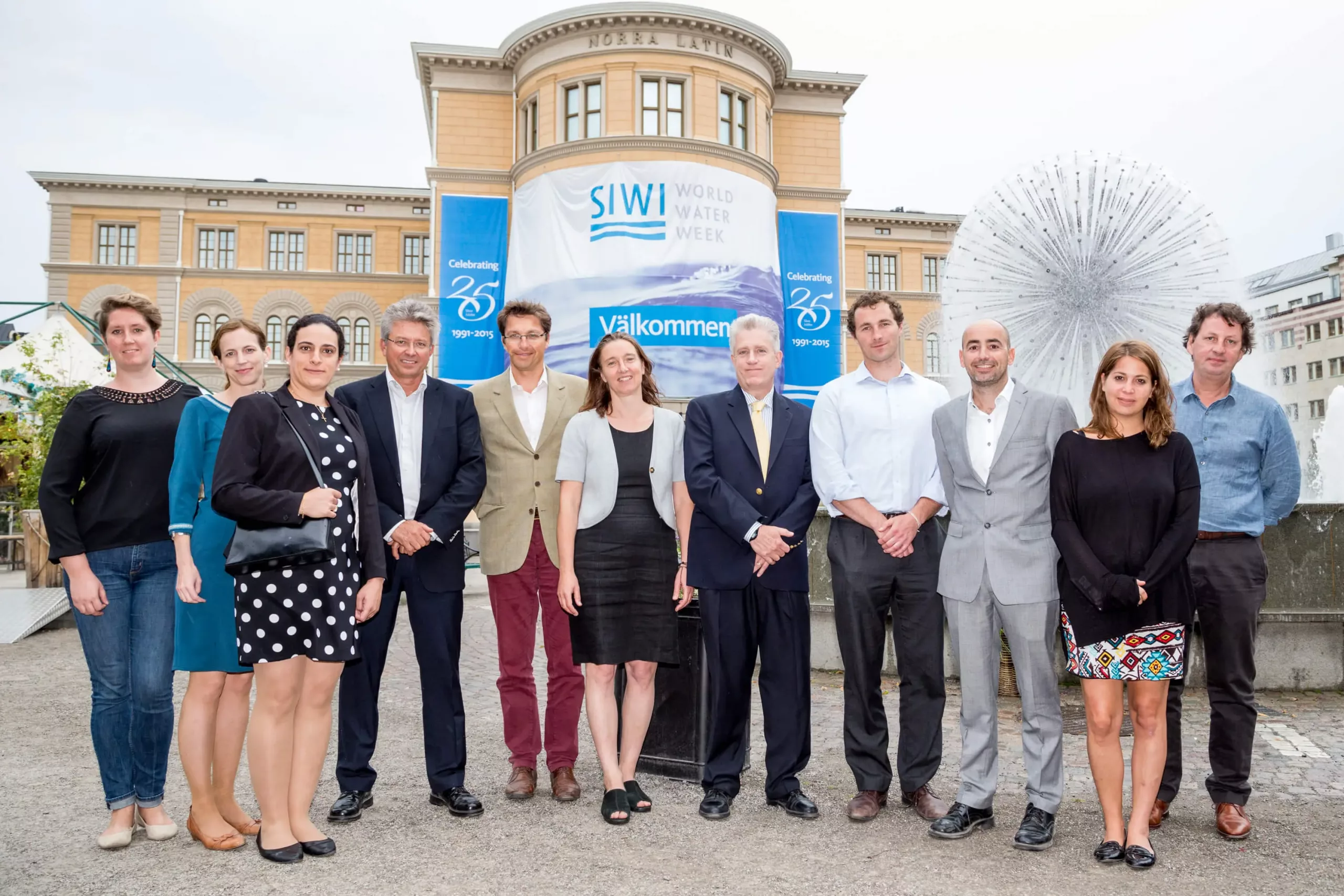WGF at World Water Week 2015
World Water Week (WWW) in Stockholm is an annual focal point for people and organisations working with the globe’s water issues. Celebrating its 25th jubilee in 2015, the Week brought together 3,300 participants, from 130 countries. Focusing on the world’s most pressing water relate challenges, its aim is to encourage discussion, cooperation, knowledge development, and foster new thinking between experts, practitioners, decision-makes, business innovators and young professionals. Major donor organizations are represented and a large number of high-level officials from developing countries attend.
The theme of World Water Week 2015, Water for Development, highlighted the current transition from the Millennium Development Goals (MDGs) to the Sustainable Development Goals (SDGs). With the recent announcement of the SDGs, this year’s WWW was a key opportunity for the global water community to discuss how the next phase of the development agenda will progress.

The 2015 WWW was also of particular importance to the Water Governance Facility (WGF) since the United Nations Development Programme (UNDP) was a key collaborating partner to the Stockholm International Water Institute (SIWI) in the arrangement of the Week. A regularly occurring event is also the UNDP-SIWI Annual Review meeting, whose participants are captured in the picture.
During the Week, WGF was active in many events:
Water Integrity Global Outlook
WGF, Cap-Net UNDP, Stockholm International Water Institute (SIWI), Water Integrity Network (WIN), International Water Management Institute (IWMI) and Global Water Partnership (GWP) held the Water Integrity Global Outlook 2015 workshop. The workshop provided an opportunity for contributors, external referees, and participants to share and reflect on the main conclusions of the Global Outlook. The Water Integrity Global Outlook report will be published in the latter part of 2015.
Don’t cheat on us! Gender dimensions in water corruption
The event Don’t cheat on us! Gender dimensions in water corruption, convened by WGF, Bremen Overseas Research and Development Association, GWP, and Women for Water Partnership, explored the gender dimensions of corruption in the water sector by showcasing the latest research and examples of women’s strategies to combat corruption in different parts of the world. Suggested recommendations on how to integrate a gender perspective in water integrity were presented and further developed together with the participants.
(Re)thinking Governance
WGF, WIN, SIWI and the Robert B. Daugherty Water For Food Institute at the University of Nebraska co-convened a workshop, titled (Re)thinking Governance. The well attended workshop explored the importance of inclusiveness and integrity in effective water governance implementation. The event also highlighted the value of being open and to learn from failures, demonstrating the positive outcomes that can occur through critical analysis of unsuccessful cases.
Democratizing Water through Accountability – from Norms to Reality

WGF, International IDEA, and Forum Syd convened the Democratizing Water through Accountability – from Norms to Reality workshop. The event looked at the importance of democratizing the delivery of water services and how this can be realized by improving accountability relations. It included a presentation of experiences from Kenya, where actions had been taken to strengthen accountability relationships through capacity development within a community. A buzz-group exercise was then held, in which participants reflected over what they would have done in order to tackle challenges presented in the Kenya case. The event was moderated by Marianne Kjellen, WGF, and Helena Bjuremalm, International IDEA.
Indigenous peoples, water and rights centred partnerships in the SDGs
WGF, International Work Group on Indigenous Affairs (IWGIA), and Tebtebba Foundation convened the Indigenous peoples, water and rights centred partnerships in the SDGs seminar. The seminar put the spotlight on the challenges indigenous peoples’ face related to equal access to water services and resources. It also discussed how indigenous peoples’ rights and interests can be strengthened in the post-2015 development agenda and the implementation of the SDGs. It looked at what we can learn from successful collaborations between indigenous peoples and private/public actors in the water sector and how different stakeholders can work together more effectively to realise equal access to water for marginalised groups. Moa Cortobius and Alejandro Jimenez presented the work and experience coming from the WGF over recent years – some of which have been summarized in research articles in Acuatic Procediae “At the Confluence” – notably: Water Co-operation between Cultures: Partnerships with Indigenous Peoples for Sustainable Water and Sanitation Services and Indigenous Peoples and Industry Water Users: Mapping the Conflicts Worldwide
Multistakeholder Forum of the EU Water Initiative
WGF and the European Commission convened the annual Multistakeholder Forum of the EU Water Initiative (EUWI). The EUWI is an international political initiative using a partnership approach. It brings together national governments, donors, NGOs, business and other water actors. The EUWI is working to reinforce political commitment to the water agenda, to create a strong and integrated framework for EU action, and is active through its regional components in: Africa, Eastern Europe Caucasus and Central Asia (EECCA), Latin America, the Mediterranean and the China-EU Water Platform. The Seminar presented experience and good practice from the ongoing work and debated on further actions developed in the different partnerships established in the EUWI framework. The main objective of the gathering was to share new initiatives being launched and cross-fertilize the different partnerships with lessons-learnt and success stories, so that the partnerships can play their role in enhancing the role of water as a driver for sustainable development. The present focus of the EUWI is on the water-energy-food security nexus. The EUWI also launched its annual report to coincide with the Week.
Improving water governance for achieving financial sustainability in the Mediterranean
Alice Nassar Jaraiseh, Programme Officer, WGF, participated in a panel discussion at the Improving water governance for achieving financial sustainability in the Mediterranean seminar. The seminar, convened by GWP and the Organisation for Economic Co-operation and Development (OECD), highlighted the efforts to implement the human right to water and access to sanitation in line with the post-2015 development agenda which are underway in the Mediterranean. It was highlighted that the massive financial gap for the sector to meet the SDG-related needs of developing countries puts water governance in the spotlight, as good governance is interlinked to sustainable financing, creating the enabling environment for much-needed investments. The event focussed on the need for pro-poor, inclusive and gender-sensitive action to be taken for better governance and on the impact that this will have on the financial sustainability of the water sector leading to sustainable development.
SIWI Sofa
The SIWI Sofa was a new feature to the WWW in 2015. The Sofa provided an opportunity to discuss particular issues being dealt with at the Week, which were then presented to the general public via SIWI’s media hub. UNDP took advantage of this new platform, conducting several sessions to highlight its work and experience.
WGF convened a sofa session with Leo Heller, UN Special Rapporteur on the Human Right to Water and Sanitation (UNSRHRWS). Leo first spoke about the barriers to indigenous peoples’ equal access to water and sanitation and what is needed in the implementation of the SDGs to overcome these inequalities. In his second session he discussed the key challenges and solutions to universal access of sanitation facilities, exploring why sanitation, compared to water access, is lagging behind and what is needed to move forward.
Marianne Kjellen, Alejandro Jimenez, and Håkan Tropp discussed issues of water governance during the Perspective on Water Governance sofa session. The session highlighted the evolution of water governance, and its role in the post-2015 development agenda.
Social event: Water Governance Facility – 10 years
To highlight the ten years of fruitful collaboration on Water Governance; the WGF brought together partners, stakeholders and staff during the Facility’s annual mingle, with some words of reflection provided by protagonists of this collaboration. Andy Hudson, UNDP, remarked on the highly productive UNDP-SIWI relationship, echoed by WGF’s first director Håkan Tropp, presently managing director for the Knowledge Services at SIWI. Cecilia Scharp, senior WASH advisor with UNICEF, commented on the fruitful and promising new collaboration on “Accountability” with UNICEF. Alejandro Jiménez, WGF, gave some perspective on working with governments on Water Governance through GoAL WaSH. Finally, current WGF Director Marianne Kjellén flagged recent manual work on the Human Rights-Based Approach to Integrated Water Resources Management and related trainings in collaboration with Cap-Net.
During this event, the Facility launched several publications:
- the Water governance in perspective brochure, explaining why Water governance is important.
- the two most recent reports, titled Explaining the Concept and Accountability in WaSH – A reference guide, from the WGF collaboration with UNICEF were presented.
- the near-final manual, titled Human rights based approach to integrated water resources management, developed by Cap-Net UNDP, Red Centroamericana de Instituciones de Ingeniería (REDICA), WGF, and WaterLex.
The HRBA-2-IWRM manual, along with long-standing “Integrity Manual,” provide the bases for on-line Courses held through the Cap-Net Virtual Campus








